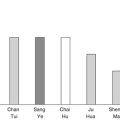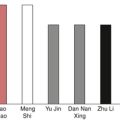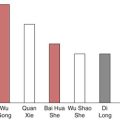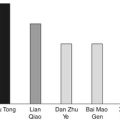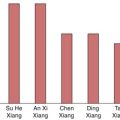Chapter Sixteen. Substances that sedate the Spirit and calm the Mind
 |
1. What are the indications for the substances that sedate the Spirit and calm the Mind?
The substances that sedate the Spirit and calm the Mind are able to treat restlessness, anxiety, palpitations, irritability, insomnia and emotional distress. The symptoms are directly caused by disturbance of the Heart, which is the residence of the Spirit, and determines the emotional, mental and spiritual features of the individual. The syndrome of Heart-Spirit disturbance can primarily be subdivided into the syndromes of Excessive-Heat and Blood deficiency.
In the Excessive-Heat syndrome, the symptoms have a pronounced and aggressive feature. Rage and stress may, in a very short time, cause Liver-Qi stagnation, Liver-Fire blazing upwards or Liver-Yang rising that influence the Heart immediately. Meanwhile, the Heart-Yin can be directly injured by Heat in many infectious diseases, which in Chinese medicine are considered as febrile diseases. Some chronic diseases often consume the Heart-Yin too. All these factors cause the Heart-Fire to blaze up, which disturbs the Spirit and leads to anxiety, irritability, palpitations, difficulty in falling asleep and dream-disturbed sleep.
In the syndrome of Blood deficiency, the symptoms have a mild and chronic feature. Since the state of the Heart-Spirit is based on sufficient Blood, when there is Blood deficiency there are symptoms such as restlessness and fear without any reason, emotional distress, palpitations, frequent sweating or night sweats, dream-disturbed sleep or frequent waking up at night. The tongue body is usually pale or delicate red with a thin white coating and the pulse is often thready, weak and restless.
In clinical practice, the syndromes are often more complicated. The Excess is often complicated with the Deficiency, and all the outlined symptoms may be present simultaneously. Therefore it may be necessary to sedate the Spirit, reduce Fire or direct the Liver-Yang to descend, as well as tonify the Blood and Yin of the body.
2. What are the characteristics of the substances that sedate the Spirit and calm the Mind? What precautions should be observed when using them?
The substances that sedate the Spirit and calm the Mind can be divided into two groups. One group focuses on sedating the Spirit; these substances can control the symptoms quickly. They are mainly used in acute situations and especially in an Excessive syndrome. A second group deals with the causes and the manifestations of the syndrome; these substances have the function of tonifying the Blood and Yin, reducing the Heat from the Heart and calming the Mind. They are used for a chronic or mild syndrome.
The substances that sedate the Spirit and calm the Mind have the following characteristics.
Entering the Heart, Liver and Kidney meridians
The five internal organs are connected with the seven emotions. Of these emotions, the symptoms of restlessness with anxiety, difficulty in falling asleep and palpitations are linked with the Heart; irritability, insomnia and dream-disturbed sleep are linked with the Liver; restlessness and fear with anxiety are linked with the Kidney. Most of the substances that sedate the Spirit and calm the Mind enter the Heart, Liver and Kidney meridians; therefore they control the disorders from different aspects.
Many mineral substances
Mineral substances in TCM are considered to have a descending nature because they are heavier in weight and more solid than the herbs. Heaviness can sedate the Spirit, descend the Yang and Fire, and control fear. They are often used for treating acute or Excessive conditions. The commonly used substances are Ci Shi ( Magnetitum), Zhen Zhu ( Margarita usta), Zhen Zhu Mu ( Concha margaritifera usta), Zi Shi Ying ( Fluoritum), Hu Po ( Succinum), Long Gu ( Mastodi fossilium ossis) and Mu Li ( Ostrea concha).
Cold and salty
Since most of the acute cases of mental disturbance are caused by Excessive- or Empty-Fire, a cold and salty substance is able to reduce and purge the Fire and protect the Yin of the body. These substances are effective for treating disorders with obvious Heat signs. The commonly used substances are Mu Li, Ci Shi, Zhen Zhu, Zhen Zhu Mu and Bai Zi Ren ( Platycladi semen).
Sweet
Sweetness has a capacity of moderating, tonifying and moistening. Some substances that are used for acute and severe cases are sweet in taste too. They can moderate the conflict and reduce the speed of the pathological progress of the disorder; Zhen Zhu and Zhen Zhu Mu are examples.
In chronic or mild cases, the sweet herbs are often used to tonify the Blood of the Heart and Liver, and moisten the Dryness that is caused by Yin and Blood deficiency. The commonly used herbs are Suan Zao Ren ( Ziziphi spinosae semen), Bai Zi Ren, He Huan Pi ( Albiziae cortex) and Ye Jiao Teng ( Polygoni multiflori caulis).
In clinical practice, one should be aware that the mineral substances control the symptoms of the disorder rather than treat the cause, so they should not be used for a prolonged period of time. When the condition of the patient has improved, the substances that treat the cause of the disorder should then be used.
Furthermore, mineral substances are heavy on the Stomach, and may cause indigestion, stomach pain and constipation; therefore they should be used together with other herbs that protect the Stomach. If the patient complains of such symptoms after taking these substances, or feels sleepy during the day, the dosage should be reduced, and may even need to be used only in the evening. In addition, the mineral substances have a descending tendency, so pregnant women should not use them, or use them with caution.
3. Ci Shi ( Magnetitum), Zhen Zhu ( Margarita usta), Zhen Zhu Mu ( Concha margaritifera usta) and Hu Po ( Succinum) are all used for disturbance of the Heart-Spirit. What are the differences between them?
All four of these substances are able to treat restlessness, palpitations with anxiety, insomnia, convulsions and epilepsy due to disturbance of the Heart-Spirit. In clinical practice, they are used to sedate the Spirit, and are particularly effective in treating acute and Excessive disorders. However, there are some differences between their actions.
Ci Shi is pungent, salty and cold. It is the strongest of the four substances for sedating the Spirit. Since it enters the Liver and Kidney meridians, it is more suitable to treat disturbance of the Spirit which is directly caused or influenced by the Liver and Kidney, with symptoms such as palpitations and restlessness with fear, dream-disturbed sleep and ease of waking up at night. It is a heavy and solid substance and is also able to stabilize the Kidney-Qi and Essence and direct the Liver-Yang to descend. Therefore it is also used for deafness, tinnitus, shortness of breath or asthma, dizziness, headache and blurred vision.
Zhen Zhu is sweet, salty and cold; its action of sedating the Heart-Spirit is more moderate than that of Ci Shi. It enters the Heart and Liver meridians and works more directly on the disorders of the Heart. It is good at clearing Fire of the Heart and Liver, and is used to treat restlessness, anxiety, palpitations, irritability, difficulty in falling asleep, epilepsy and febrile convulsions. It can also treat blurred vision, such as in cataract due to Heat in the Liver and Heart.
Zhen Zhu Mu is the pearl shell. Like Zhen Zhu, it is cold and salty, and enters the Heart and Liver meridians. It also has the function of clearing Heat from the Heart and Liver, and sedating the Spirit, but its action is weaker than that of Zhen Zhu. However, it is more effective for subduing the Liver-Yang and treating dizziness, headache and tinnitus, and is more suitable for use when the patient suffers from Liver-Yang rising syndrome and also complains of palpitations, irritability and insomnia.
Hu Po is sweet and neutral, and enters primarily the Heart and Liver meridians. It enters the Blood level of the Heart and Liver, and is particularly effective for sedating the Spirit and removing congealed Blood. In clinical practice, it is used for patients with Heart diseases when the Blood is not circulating properly, and at the same time the patient has palpitations and restlessness, such as is seen in coronary heart disease. It is also used for febrile convulsions and epilepsy.
4. What are the differences in function between Long Gu ( Mastodi fossilium ossis) and Long Chi ( Mastodi fossilia dentis)?
Long Gu and Long Chi are different parts of fossil fragments and both have the function of sedating the Heart-Spirit. However, there are differences between them.
Long Gu is sweet, neutral and astringent, and enters the Heart, Liver and Kidney meridians. Its action in sedating the Spirit is not as strong as that of Long Chi, but it can also control fear as it works on the Kidney. Long Gu has two further functions that Long Chi does not. First, it can anchor the Liver-Yang to treat Liver-Yang rising, which manifests as dizziness, tinnitus, headache and dream-disturbed sleep. Secondly, it can stabilize the leakage of the Essence and Body Fluids. If a patient suffers from Liver-Yang rising, as well as palpitations, anxiety with fear, insomnia and night sweating, Long Gu is more suitable than Long Chi.
Long Chi is cold and enters the Heart and Liver meridians. It is heavier than Long Gu and its descending property is stronger and quicker than that of Long Gu. Long Chi is very effective for sedating the Heart-Spirit and calming the Mind, and is used to treat manic–depressive psychosis, hysteria, anxiety, irritability and insomnia.
5. What are the differences between Long Gu ( Mastodi fossilium ossis) and Mu Li ( Ostrea concha) in the function of calming the Mind?
Long Gu and Mu Li both have the function of pacifying the Liver and calming the Mind. They are both astringent substances and are also able to stabilize the Essence and Body Fluids. Both can be used to treat insomnia, irritability, dizziness, night sweating and spermatorrhea.
However, compared with Mu Li, Long Gu has a stronger effect in sedating the Heart-Spirit and calming the Mind. It is sweet and neutral, and is more effective in treating insomnia, restlessness, palpitations and dream-disturbed sleep.
Mu Li is salty and cold, has a stronger effect in reducing Heat in order to calm the Mind, and is more effective for treating night sweats and restlessness with anxiety. Mu Li also has another function—that of softening hardness and dissipating Phlegm. If the mental disorder is caused by Phlegm-Heat with symptoms of night sweating, insomnia and irritability, such as seen in schizophrenia, manic–depressive psychosis, hepatocirrhosis and hepatic coma, Mu Li is more suitable than Long Gu. In clinical practice, however, Long Gu and Mu Li are often used together to strengthen the function of pacifying the Liver and calming the Mind so as to be able to treat more complaints.
6. What are the differences in treating insomnia between Suan Zao Ren ( Ziziphi spinosae semen), Bai Zi Ren ( Platycladi semen), Ye Jiao Teng ( Polygoni multiflori caulis), He Huan Pi ( Albiziae cortex) and Yuan Zhi ( Polygalae radix)?
These five are all commonly used herbs to treat insomnia. Except for Yuan Zhi, they are all sweet herbs. They can tonify the body and calm the Mind, and are particularly suitable for treating long-term insomnia due to disorders of the internal organs. However, each herb has its own characteristics, so the applications of each are also different.
Suan Zao Ren is sweet and sour; it enters primarily the Liver meridian, and secondarily the Heart meridian. Sweetness can tonify the Liver and Heart-Blood, and sourness can stabilize the Blood and the Qi. It is the most commonly used herb to tonify the Liver-Blood and calm the Mind. It is particularly effective for treating restlessness and irritability with no reason, restless sleep, dream-disturbed sleep and nightmares.
Bai Zi Ren primarily enters the Heart meridian, and enters the Liver meridian secondarily. It is sweet and has a moistening nature. It is an excellent herb for nourishing the Heart-Blood and calming the Mind. It also has the function of stopping sweating and is more suitable for treating difficulty in falling asleep, restlessness and palpitations, a tendency to become nervous easily and sweating. Since the mental state and sleeping are related to Heart and Liver, Suan Zao Ren and Bai Zhi Ren are often used together.
Ye Jiao Teng is the vine of the same plant as He Shou Wu ( Polygoni multiflori radix). Like He Shou Wu, it also has the function of tonifying the Blood. It is sweet and neutral, and enters the Heart and Liver meridians. It is able to tonify the Blood and calm the Mind, as well as open the meridians and collaterals. It is especially suitable for treating conditions in which the Blood is too weak to circulate properly and causes restless sleep, dream-disturbed sleep and insomnia, together with an uneasy sensation in all muscles during and after sleep.
He Huan Pi is sweet and neutral, and enters the Heart, Spleen and Lung meridians. It regulates the Qi in the chest and calms the Mind. It is especially suitable for treating patients who suffer from depression as well as insomnia, with symptoms such as sadness, grief, tightness in the chest and reduced appetite.
Yuan Zhi is pungent and bitter, and enters the Heart and Kidney meridians. Pungency has a dispersing nature and bitterness has a descending property, so the herb is good at removing Phlegm and improving the Qi connection between the Heart and Kidney so that the Mind is calmed and sleep improves. It is suitable for treating palpitations, forgetfulness, poor concentration and insomnia. In clinical practice, this herb should be used with caution because when the dosage is too high, it can irritate the gastric mucosa and cause nausea, and it can also increase the secretion of the respiratory tract.
7. Dang Gui ( Angelicae sinensis radix), Bai Shao Yao ( Paeoniae radix lactiflora), Bai He ( Lilii bulbus), Fu Ling ( Poria), Sheng Di Huang ( Rehmanniae radix) and Mai Men Dong ( Ophiopogonis radix) can all calm the Mind. What are the differences between them?
Dang Gui and Bai Shao Yao are a pair of herbs that tonify the Blood. Although they have no function in calming the Mind in themselves, they are effective for nourishing the Blood of the Heart and Liver, and are often used with Suan Zao Ren ( Ziziphi spinosae semen) and Bai Zi Ren ( Platycladi semen) to treat insomnia due to Blood deficiency.
Bai He is sweet and bland, slightly cold, and enters the Lung and Heart meridians. It is particularly effective for moistening the Lung-Yin and nourishing the Heart-Yin. It is also able to calm the Mind. It is often used together with He Huan Pi ( Albiziae cortex) to treat insomnia with depression due to Lung-Yin and Heart-Yin deficiency and Liver-Qi stagnation.
Fu Ling is sweet, neutral and bland, and enters the Heart, Spleen and Bladder meridians. It has the functions of tonifying the Spleen-Qi and Heart-Qi, and calming the Mind. It is often used together with other herbs to tonify the Qi and Blood to calm the mind.
Sheng Di Huang and Mai Men Dong are both sweet and cold, and enter the Heart meridian. They can nourish the Yin and reduce Heat. They are also often used together with Ci Shi ( Magnetitum), Zhen Zhu Mu ( Concha margaritifera usta), Long Gu ( Mastodi fossilium ossis) and Mu Li ( Ostrea concha) to treat insomnia due to Excessive- or Empty-Heat in the Blood that disturbs the Heart-Spirit.
Although these six herbs do not directly calm the Mind, or are not strong enough to calm the Mind alone, they are able to treat the causes of the disorder. They can form some very good combinations with other herbs that calm the Mind to enhance their functions.
Comparisons of strength and temperature in substances that sedate the Spirit and calm the Mind
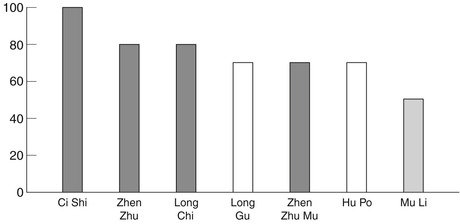 |
| Fig. 16.1. |
| Comparison of the substances that directly calm the Mind. Ci Shi ( Magnetitum), Zhen Zhu ( Margarita usta), Long Chi ( Mastodi fossilia dentis), Long Gu ( Mastodi fossilium ossis), Zhen Zhu Mu ( Concha margaritifera usta), Hu Po ( Succinum), Mu Li ( Ostrea concha). |
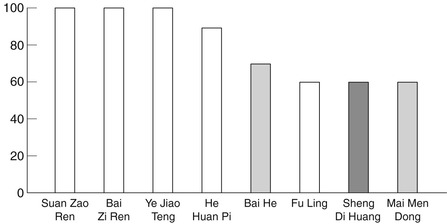 |
| Fig. 16.2. |
| Comparison of the herbs that nourish the Heart, calm the Mind and improve sleep. Suan Zao Ren ( Ziziphi spinosae semen), Bai Zi Ren ( Platycladi semen), Ye Jiao Teng ( Polygoni multiflori caulis), He Huan Pi ( Albiziae cortex), Bai He ( Lilii bulbus), Fu Ling ( Poria), Sheng Di Huang ( Rehmanniae radix), Mai Men Dong ( Ophiopogonis radix). |
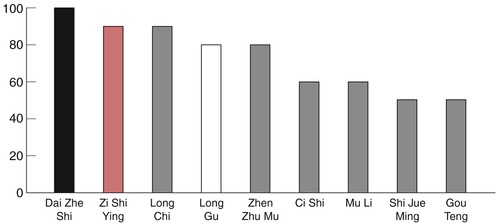 |
| Fig. 16.3. |
| Comparison of the substances that anchor the Liver-Yang and calm the Mind. Dai Zhe Shi ( Haematitum), Zi Shi Ying ( Fluoritum), Long Chi ( Mastodi fossilia dentis), Long Gu ( Mastodi fossilium ossis), Zhen Zhu Mu ( Concha margaritifera usta), Ci Shi ( Magnetitum), Mu Li ( Ostrea concha), Shi Jue Ming ( Haliotidis concha), Gou Teng ( Uncariae ramulus cum uncis). |
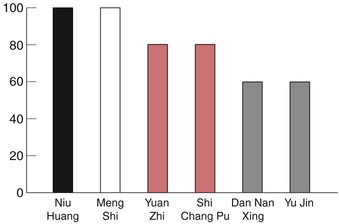 |
| Fig. 16.4. |
| Comparison of the substances that transform Phlegm and settle the Spirit. Niu Huang ( Bovis calculus)**, Meng Shi ( Lapis micae seu chloriti)*, Yuan Zhi ( Polygalae radix), Shi Chang Pu ( Acori graminei rhizoma), Dan Nan Xing ( Pulvis arisaemae cum felle bovis), Yu Jin ( Curcumae radix). |
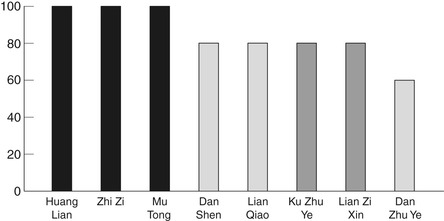 |
| Fig. 16.5. |
| Comparison of the herbs that clear Excessive-Heat from the Heart and calm the Mind. Huang Lian ( Coptidis rhizoma), Zhi Zi ( Gardeniae fructus), Mu Tong ( Mutong caulis)*, Dan Shen ( Salviae miltiorrhizae radix), Lian Qiao ( Forsythiae fructus), Ku Zhu Ye ( Bambusae amarae folium), Lian Zi Xin ( Nelumbinis plumula), Dan Zhu Ye ( Lophatheri herba). |

